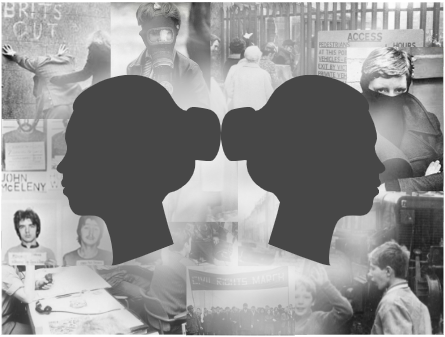
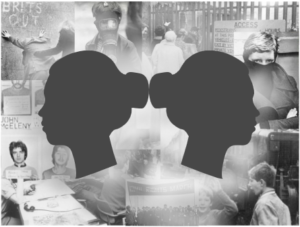 [rating=4]Commanding performances by Amber Washington, Brittney Brown, and Ann Sheridan Smith make the Factory Theater’s world premiere production of “The Kelly Girls” a standout. Written by ensemble member Shannon O’Neill and carefully directed by Spenser David, this thought-provoking drama personifies “the Troubles” in Belfast, Northern Ireland, from the 1960s forward. We see violent sectarian conflict brought down to the level of the microcosm, as we follow the exploits of two young Catholic girls, their families, their military team leaders, and their comrades-in-arms. This story is framed around an account of the conflict from the perspective of one individual, namely Fianna Kelly (Washington), as told to a researcher at Boston College named Aiofe Connolly (Mandy Walsh), presumably sometime in the 1990s. In her interviews with Connolly, Fianna explains what happened to her and her younger sister Regan (Brown) when the two of them chose to become a part of the Provisional Irish Republican Army.
[rating=4]Commanding performances by Amber Washington, Brittney Brown, and Ann Sheridan Smith make the Factory Theater’s world premiere production of “The Kelly Girls” a standout. Written by ensemble member Shannon O’Neill and carefully directed by Spenser David, this thought-provoking drama personifies “the Troubles” in Belfast, Northern Ireland, from the 1960s forward. We see violent sectarian conflict brought down to the level of the microcosm, as we follow the exploits of two young Catholic girls, their families, their military team leaders, and their comrades-in-arms. This story is framed around an account of the conflict from the perspective of one individual, namely Fianna Kelly (Washington), as told to a researcher at Boston College named Aiofe Connolly (Mandy Walsh), presumably sometime in the 1990s. In her interviews with Connolly, Fianna explains what happened to her and her younger sister Regan (Brown) when the two of them chose to become a part of the Provisional Irish Republican Army.
Fianna’s personal account is told in flashback. At the beginning of the show, we see the two Kelly sisters and their mother Dierdre (Smith) facing religious bigotry by a local vendor, followed thereafter by the vicious and deadly attack on a popular bar, owned and operated by their father Shane (Ben Veatch). We see how these and other acts of violence served to motivate both girls—each in their own way—to become actively involved as IRA members when they were teenagers in the early 1970s. As Fianna reflects on her experiences and elaborates on her recollections, the device of an ever-changing timeline of flashforwards and flashbacks is used to tell her story. Connolly either asks a pertinent research question or narrates the circumstances that move the action from A to B to C then A then D, then Y, etc.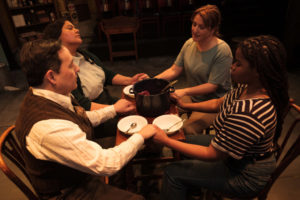
It is particularly interesting to see how the guerrilla forces among the Provisional IRA operate as a team as they engage in militant action against the Protestant Unionists. Among other things, all the members must take an oath, such that they must think of their unit as their family. They dare not question the edicts from higher-ups. In this respect, the words of Gerry Adams (Rob Koon) and Hugh Keane (Patrick Blashill) carry more weight than those of others on the team, such as Denny (Joshua Servantez), Oscar (Vic Kuligoski), and Brendan (Elliot Sagay), all of whom are initially uneasy about welcoming a woman to their inner circle. While the audience does not witness most of the pain and tragedy inflicted by the team’s brutality, this does not take away from the show’s realism. It is during a few notable exceptions that the emotions pour out among the characters, revealing that war is far from being banal. Regardless of which side of the divide a soldier is on, the enemy is a human being after all.
Generally speaking, I found that the idea of gathering interviews for historical research on the topic of the IRA to be a convincing framework for the plot. But the constant use of flashbacks was not always as successful a device as it could have been. For example, some members of the audience found it difficult when the girls’ father is resurrected during a flashback. Yet the directing in this play is marvelous! David moves us seamlessly from scene to scene, and the mounting tension brings us to several high points where the characters are in conflict with each other. The arguments among them are some of the best parts of the performance! Another highlight is just how comfortable the actors are in speaking Irish brogue; this is due, in large part, to the fine work of Lauren Grace Thompson, the dialect coach.
The action takes place on a very small stage: on a set which is versatile and wonderfully crafted, thanks to set designer Manny Ortiz. The red brick walls are plastered with handbills and serve as a likely exterior, while at the same time, the set doubles as the interior of various rooms. Props designer Meg X. McGrath has provided us with a wide range of items that each of the actors holds easily and believably: from guns to teacups, not to mention suitcases and boxes that presumably contain explosives. What I especially liked are the intentionally imaginary items, such as the lack of tea in the teapot! Lighting designer Benjamin Carne and sound designer Hannah Foerschler not only use light and sound to demarcate scenes but also to create simulated bomb blasts and gunshots (which are not so loud so as to distract from the narrative). Kudos especially must go to fight choreographer Chris Smith and intimacy designer Jennifer L. Mickelson in the way they designed the various situations involving close contact, such that the actors are not injured or harmed in any way. Finally, Rachel Lambert’s costume design demonstrates her fine attention to detail, from the military uniforms to the casual dress of the characters.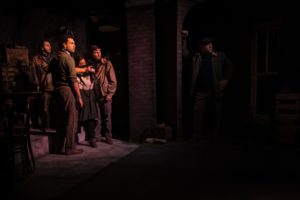
This is a very good show to take in in commemoration of St. Patrick’s Day. But the one major fault in the script is that it is largely deficient in Irish/British history. We learn quite a bit about the IRA and how it differs from the Provisional IRA, and we find out something about its leadership. But to fully appreciate the story, the audience should already have some basic familiarity with the conflict between Protestants and Catholics in Northern Ireland during this time period. Unless we do a quick read of our history books, we don’t really know why (or how) the Protestants wanted to remain a part of the United Kingdom as compared to the Catholics, who sought to join the Republic of Ireland. Including some of this historical background would serve, in part, as some explanation for anti-Catholic (and anti-Protestant) bias and would help the audience understand the underpinnings of the violence and hatred. That said, sometimes Walsh brings up some historical information and occasionally Smith does too: both as strolling narrators. But this is done almost in passing and seemingly as an afterthought. Perhaps having a separate narrator (who is not already another character) might have been better in order to present the historical record much more smoothly.
What makes this story so special, however, is that the underlying theme has to do with moral choice. Do you strictly follow orders from the top, or do you follow your own conscience and your own mind? And to what extent are you responsible for the decisions that you make in wartime? This specific account about the guerrillas in the Provisional IRA raises other fundamental questions too: When and under what conditions does one remain loyal to the war effort? How and when does an individual decide how much longer the conflict must go on or how long their participation must last? When should a person—on their own accord—call the fighting quits? Ultimately, larger forces had a lot to say about the persistence of conflict in Northern Ireland. As events moved from the 1980s into the 1990s, it became clear that while revenge may be sweet, sometimes the quiet whisperings of peace may be even sweeter—and retaliation was no longer a motive for war. Clearly, this story has a lot to do with the meaning of family and who is being defined as part of one’s family. But since it is also about allegiances to one’s country, religion, and righteous political cause, much more ought to be made of each of these things so as to provide a stronger and more comprehensive basis for the moral choices that the characters make. This would make the ending sharper and more powerful than what it already is.
“The Kelly Girls” is playing through April 1, 2023 at the Factory Theater,1623 W. Howard Street, in Chicago’s Rogers Park neighborhood.
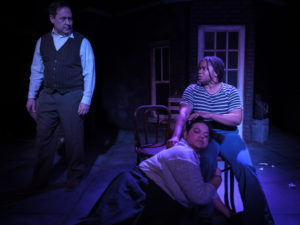 General Admission Tickets: $25.
General Admission Tickets: $25.
Performance Schedule:
Fridays and Saturdays at 8:00 p.m.
Sundays at 3:00 p.m.
Two Thursday performances: March 23 at 8:00 p.m. and March 30 at 8:00 p.m.
Tickets are available through https://web.ovationtix.com/trs/cal/18 or in person at the Box Office at 1623 W. Howard Street, or call 312-275-5757.
For more information about this show, go to: http://thefactorytheater.com/portfolio/the-kelly-girls/.
For general information about The Factory Theater and to learn about their other offerings, visit: http://thefactorytheater.com/.
For safety standards, including COVID-19 requirements, see: http://thefactorytheater.com/safety-agreements/. These protocols may change at any moment. Currently, patrons are highly encouraged to wear masks while inside the theater. See http://thefactorytheater.com/wp-content/uploads/2023/01/COVID-Precautions-Factory-Theater-12.10.22-Patrons.docx.pdf for more details.
To see what others are saying, visit www.theatreinchicago.com, go to Review Round-Up and click at “The Kelly Girls”.


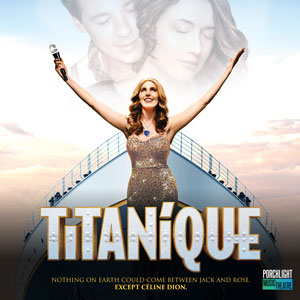
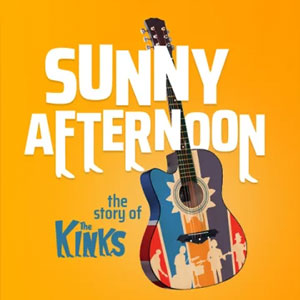
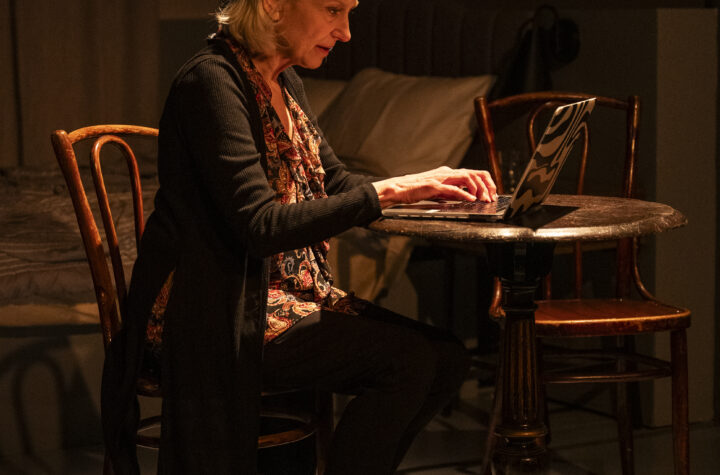
More Stories
“Titanique”
“Sunny Afternoon” reviewed by Carol Moore
“No Such Thing”